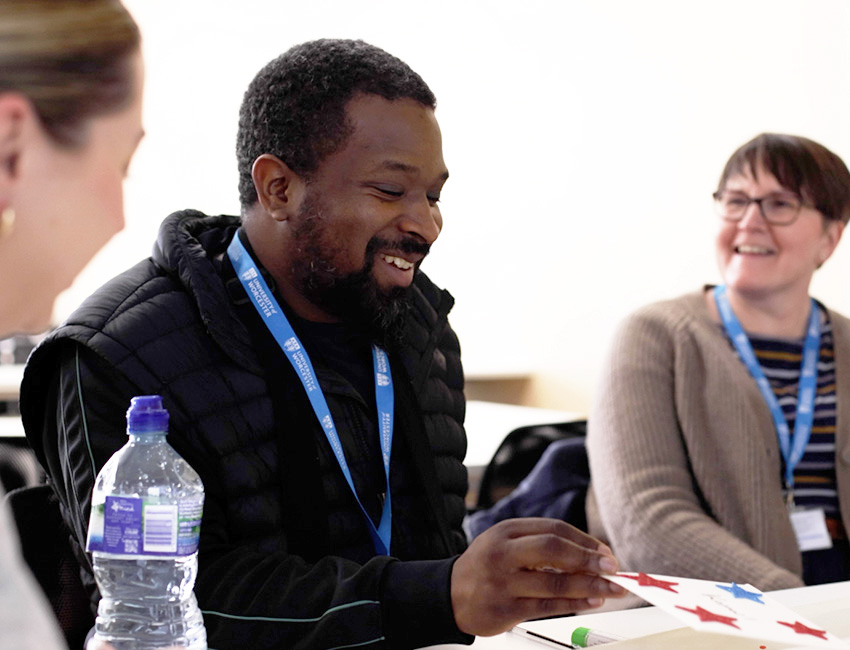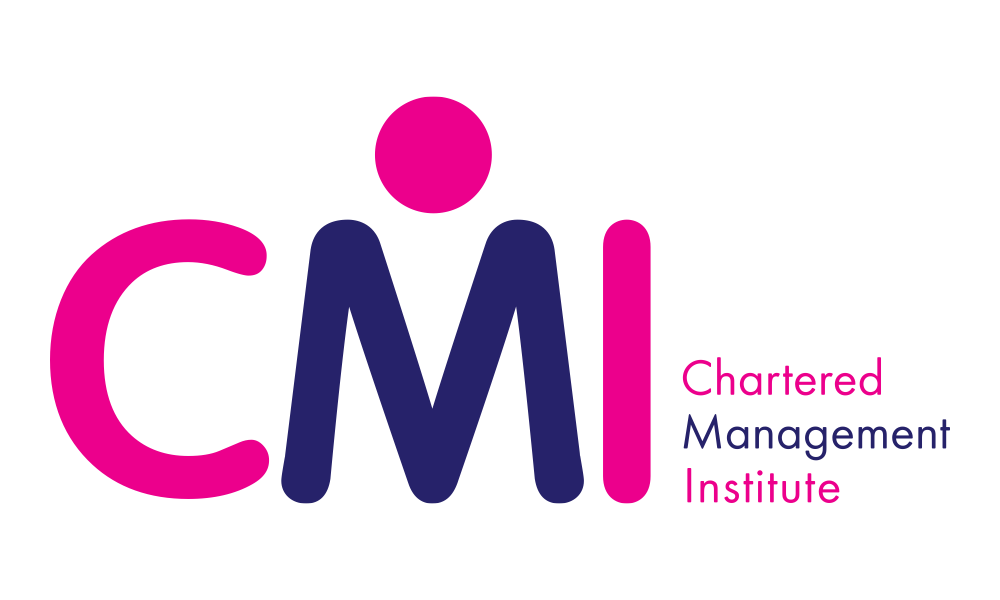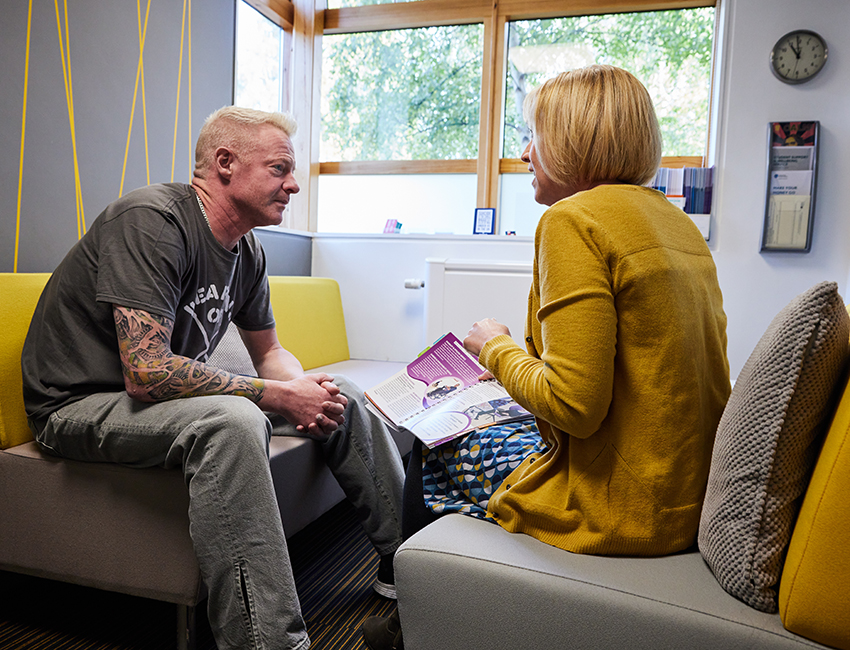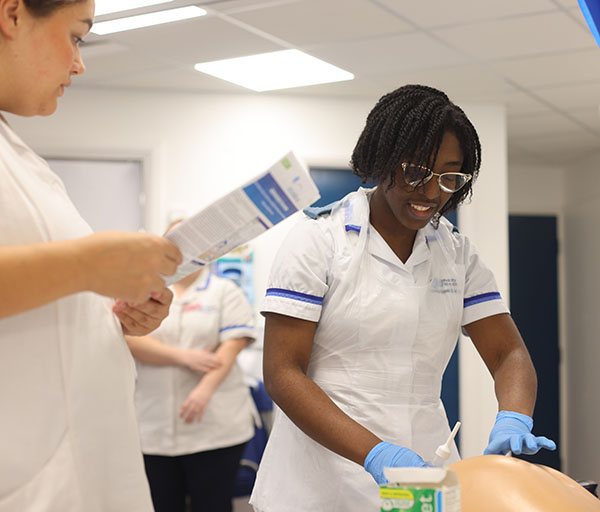At Worcester you’ll learn from our team of experts across a broad range of disciplines. This accredited course will also provide you with a Chartered Management Institute (CMI) Award in Equality, Diversity and Inclusion and a CMI Certificate in Management and Leadership, which will help you progress your career.
for graduate prospects in health studies
for student satisfaction in health studies
This course has been mapped for dual accreditation with the Chartered Management Institute (CMI). You will be awarded a CMI Level 5 Certificate in Management and Leadership, in addition to your degree, upon the successful completion of the entire degree.
During your studies, you will also benefit from associate membership to the CMI (at no extra cost), inclusive of an interactive induction session hosted by the CMI, as well as access to the CMI's digital library, resources, and employability skills audit.
University of the Year finalist
Recognised for our graduate success, we’re shortlisted for University of the Year in the Times Higher Education Awards 2025.
Overview
This course provides students practising at all levels, including existing and aspiring managers, with a developmental route such as Registered Manager in social care.
This course will enhance your existing qualifications by gaining the knowledge and skills to critique and engage with current developments within the sector. Building on your knowledge of person-centred care, you will explore issues of inclusion and diversity; community empowerment, substance misuse; mental health and the management of change.
You’ll explore fairness, health and social issues, ethics and cultural, political and economic issues, and how these impact care provision. With support from your lecturers, you'll learn how to critically investigate opportunities to provide support or intervention in improving health and/or welfare outcomes, and advocate for the person-centred approach, where the patient is at the centre of all care related decisions.
The course is designed to set you up for lifelong learning and continuous career development. Over the years, our graduates represent a broad range of practice settings and have commitment to the promotion and maintenance of human dignity, as well as the ability to thrive in an increasingly dynamic and challenging workplace.
Throughout the course you’ll also develop your academic and transferable skills, increasing your confidence and professional growth. By the time you graduate, you’ll be an adaptable, forward-thinking practitioner who can make an increasingly positive impact on the communities you serve.
Course content
Through timetabled lectures, seminars and independent study; you’ll explore the depths of person-centred care throughout the life course before developing your own research through your dissertation. Optional modules and projects will help you focus on your specialist interests throughout the course.
Reflective practice will be encouraged and built into personal development as you progress through the course. You’ll be able to track your progress, and craft strategies for progressing your career and practice.
We regularly review our courses to reflect the latest research and developments in the subject area, as well as feedback from students, employers and the wider sector. As a result, modules may change to ensure the course remains current and relevant.
Optional modules will run if enough students choose to study them. It is not guaranteed that all modules will be offered every year.
Optional modules
Careers
This top-up degree will support your career progression and enable you to stay up to date with current practice. Once you’ve completed the course, you’ll have the confidence and relevant research knowledge to advocate for others and progress into leadership roles and implement policy. You could also progress onto post-graduate study, such as professional courses like MA Social Work, PG Cert Mental Health Practitioner and MSc Nutrition and Lifestyle Medicine.
Examples of areas graduates have progressed into after completing a top-up degree are:
- Statutory, voluntary and independent sector health and social services
- Statutory and voluntary sector organisations working with older people, families and people with disabilities
- Advice and guidance services
- Advocacy and social justice services
- Social enterprise
- Housing support services targeting young people
- Community-based provision and services
- Health promotion services
- Welfare services
- Care services
"Thank you to you all for your help and encouragement over the past academic year. I feel I have gained a great deal from my time at university both academically and personally."
Course highlights
Teaching and Assessment
Through a combination of independent study, engaging teaching, and personalised support from our academics, you’ll have the opportunity to reflect on your progress and develop a strong portfolio of skills, achievements, and experiences that will empower you to thrive and develop your career within health and social care.
Teaching and assessment contents
Teaching is tailored to support your development of knowledge, skills and attitudes through a mix of lectures, seminars, group work, case studies and practical based working. Your personal reflection will play a key role in supporting your progress, and deepening your understanding of how to critically analyse research and evidence.
Entry requirements
- A Foundation degree, DipHE, HND or equivalent qualification in health, care or welfare or related subject
- Supportive academic reference
We will also consider applicants from non-standard entry routes.
We encourage applications from candidates who can provide evidence of their ability to work at Level 6 and substantial experience of working within health, care or social welfare.
If your qualification is not listed, please contact our Admissions team for advice.
International students
If English is not your first language you will need to show that you have language skills at IELTS level 6.0 (with no skill below 5.5) or equivalent.
For country specific information see our international student pages.
Mature students
If you will be over the age of 21 at the beginning of your undergraduate study, you are considered a mature student. At Worcester this means our offer may be different, taking into account any work or life experiences you have, alongside any qualifications you hold.
If you’re unsure whether you meet certain requirements you can email our admission team admissions@worc.ac.uk or contact the course Admissions Tutor.
Any questions?
If you have any questions about entry requirements, please call our Admissions Office on 01905 855111 or email admissions@worc.ac.uk.
Fees
Fees contents
UK and EU students
In 2026/27 the standard fee for full-time home and EU undergraduate students on BA/BSc/LLB degrees and FdA/FdSc degrees is £9,790 per year.
Tuition fees are reviewed annually and may increase each year for both new and continuing students.
For more details on course fees, please visit our course fees page.
International students
In 2026/27 the standard tuition fee for full-time international students enrolling on BA/BSc/LLB degrees and FdA/FdSc degrees is £17,200 per year.
Tuition fees are reviewed annually and may increase each year for both new and continuing students.
For more details on course fees, please visit our course fees page.
How to apply
How to apply contents
Applying through UCAS
UCAS is the central organisation through which applications are processed for full-time undergraduate courses in the UK.
Read our how to apply pages for more information on the application process, or if you’d like to apply for part-time study.
Contact
If you have any questions, please get in touch. We're here to help you every step of the way.

Admissions Office
admissions@worc.ac.uk01905 855111More to explore
Open Days
Visiting us is the best way to get a feel for student life at the University of Worcester.

The City of Worcester
Worcester is a welcoming university city with great transport links and plenty of student parking.

Accommodation
Benefit from our accommodation guarantee. We have rooms on campus to suit every budget including en-suite options.











